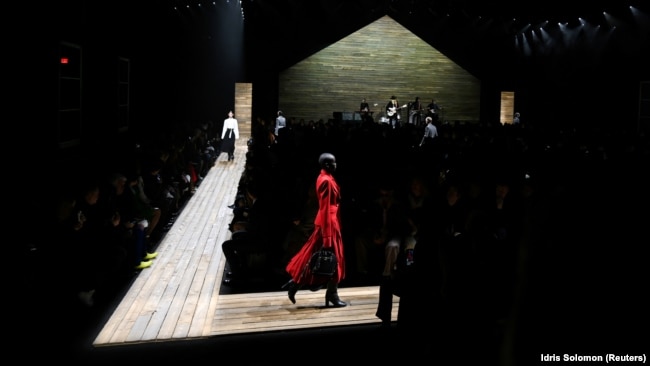ファッション業界に異変がーコロナ禍
実は、モデル歴15年だった私。
コレクションのランウェイも数知れず、TVCM, 雑誌、ポスター等など。
懐かしい感じ?と思いきや、
今回の記事、ブランド業界の裏側が透けて見えるお話し。
ふむふむ、いい事ですよね。
なんせ、コレクション多過ぎ感ありましたからね。
(仕事している時はありがたいお話しでしたが)
消費者目線としては、業界に踊らされてるような。。。
欲しいものが欲しいときに手に入らない。。。
早々に買ったら、冷夏だったり暖冬だったり。。。
さあ、いまやどんなことに?
VOAニュースから。
- ファッション業界はそのスケジュールを見直し、他の変化に目を向ける
- モード界のカレンダー
- 新たなコレクション「プレ」「リゾート」とは?
- グッチのコレクションスケジュール
- サンローラン、パリコレ不参加へ
- 本文中のWordから
- 原文 Fashion Industry Clears Its Calendar, Looks to Other Changes
ファッション業界はそのスケジュールを見直し、他の変化に目を向ける
Fashion Industry Clears Its Calendar, Looks to Other Changes
アルマーニからグッチまで、トップの高級服メーカは、ファッションショーを開催したり、新しいラインの服を発売したりする速度を遅くしています。
この動きは、コロナウイルスの健康危機により、ファッション業界が運営方法の再考を余儀なくされていることに起因しています。
高級デザイナーは、ロンドン、パリ、ミラノ、ニューヨークのファッション・ウィークで年間を通して発表するコレクションの数を減らしています。
世界中の保健当局がコロナウイルスの蔓延を抑えるために自宅待機命令を発表してから2ヶ月以上が経過しました。それ以来、多くの店舗が閉鎖され、高級服メーカは製品を製造する工場での作業を停止しています。ビジネスアドバイザリーサービスを提供するベイン・アンド・カンパニーは、3100億ドルの高級品業界の今年の売上高は最大35%減少すると予測しています。
高級服メーカは売れ残り商品が多くて苦戦しています。そして、高級品の値下げの可能性は、彼らの公共イメージにダメージを与えるだけでなく、利益にも悪影響を与える可能性があります。
デザイナーのマイケル・コース氏は、もっとも早くウイルス感染後のファッション日程の減速を要求した人物です。彼のビジネスは9月にニューヨークのファッションショーから撤退しました。
コース氏 は、春夏のコレクションと秋冬のコレクション、年に 2 つだけにすると言っています。これは ”リゾートと初秋” コレクションを作らなくなることを意味しています。これらのコレクションは、海外旅行のためのホリデーウェアを提供しています。これらのコレクションは人々のニーズを満たしていないと批評家たちが言うデザイナーの作品の数を増やしてきましたー特に不況下では。
ロバート・バーク氏は、高級品の販売ビジネスにアドバイスを提供するサービスのロバート・バーク・アソシエイツの創設者です。彼はロイター通信に、コレクション数を減らす動きは、一般の人々が使い捨てのファッションから離れていくことと関連していると言います。
ファッション産業の本質についての議論は、コロナウイルスよりも前からあります。しかし、健康危機によって、企業はコストを削減し、あまりにも多くのお金を失うことなく製品を販売するように圧力をかけられています。
コーツ氏は、これからは春夏と秋冬のシーズンに向けて、ゆっくりと商品が店頭に届くようになるといいます。これは「顧客が実際にどのように生活し、どのように買い物をしているか」をより正確に表しているのです、と同社の代表者は言います。
アルマーニ氏は、ファッション業界の出版物であるWWDへの公開書簡で、高級企業はファストファッションの配達カレンダーに従うことを止めるべきだと述べました。
「僕のジャケットやスーツの一着がたった3週間で、あまり違いがない新しい商品に置き換えられるなんてナンセンスである。」と彼は書いたのでした。
アレッサンドロ・ミケーレ氏は、フランス人オーナーであるケリング氏のためにグッチを非常に収益性の高いものにしましたが、同社の年間ショーを5回から2回に減らすだろうと言っています。
そして、5月末の決算発表では、ラルフ・ローレンは季節商品を減らし、オールラウンドに使える服を増やしていくと述べました。ローレンの最高財務責任者ジェーン・ニールセン氏によると、サマーコレクションは8月まで店頭に並ぶということです。
グッチやLVMHのディオールのような企業は、特に中国の富裕層バイヤーにアピールするために、より頻繁なコレクションや伝統的ではない場所での高価なイベントを利用してきました。
高級品の支出が危機に見舞われる中、業界関係者の中には、莫大な広告予算を持つことはもはや意味がないと言う人もいます。ファッションショーには100万ドル以上の費用がかかることもあるのです。
ショーの開催や制作費の削減に向けた動きは、米国のファッション企業と大手デパートの関係が変化していることの証しでもあります。店舗のオーナーは長い間、商品の鮮度を保つために、商品の発売時期をコントロールしてきました。
サックス・フィフス・アベニューの元社長であるロン・フラッシュ氏は、健康危機がニーマン・マーカスをはじめとする米国のトップストアの崩壊に拍車をかけていると語りました。昔ながらのビジネスのやり方が今、ますます疑問視されている、と彼は指摘しています。
しかし、ファッションデザイナーの中には、ファッションカレンダーの軽量化を求める声に抵抗する者もいる。好調のうちに5月に値上げしたシャネルは、それでも年に6つのコレクションを発表すると述べました。
モード界のカレンダー
大きく分けて「春夏」と「秋冬」の2シーズンが柱になっています。
春夏は「Spring/Summer」の頭文字を取って、「SS」と略されます。
今の2020年春夏シーズンは「2020SS」とか「20SS」と書くのが普通です。
秋冬のほうは「Autumn/Winter」を略して「AW」、または「Fall/Winter」の略で「FW」と書きます。
ブランド・企業ごとに書き方はまちまちです。
「Summer」を省いて「2020Spring」とだけ書くケースもあります。
年をまたぐ秋冬の場合、主なメディアは「2020-21年秋冬」と書きますが、ブランド側は「2020Fall」とだけ書くこともあり、それぞれで独自のシーズンを設定している場合もあります。
新たなコレクション「プレ」「リゾート」とは?
近年は、基本の春夏と秋冬以外に、新たな「シーズン」が増えてきました。
それが「プレスプリング」と「プレフォール」。
どちらも、季節をまたいで着やすい服が提案されていることが多くなっています。一般的に、冬のセールが終わって1月中旬頃から徐々に春夏物が店頭で展開されますが、冬のセールが始まる前あたりから、早く次シーズンの商品を紹介するのが「プレスプリング」。早くて11月頃から入荷するところもあります。買う側にとっては、春物を先物買いできるメリットがあります。
一般的にはプレスプリング物は春夏コレクション物よりも、比較的コーディネートしやすい服が多く、値段も少し抑えめ。春夏コレクションで発表される前から新トレンドのエッセンスを取り入れられるのに加え、シーズンレスなテイストが多いのも魅力です。一方、「プレフォール」は早くて5月頃から販売されます。夏のセール前からセール中、あるいは秋冬物が店頭に並ぶ前のタイミングです。
グッチのコレクションスケジュール
サンローラン、パリコレ不参加へ
本文中のWordから
プレフォール・コレクション(Pre-Fall Collection)
毎年12月から1月頃にかけて、実際のシーズンよりは9か月程度早く、
近年、大体の世界的ブランドが発表するようになっているコレクション。
"Pre-Fall"という名前の通り、
"秋前(晩夏・初秋)"の時期に向けたアイテムを発表する場。
ファスト・ファッション(Fast Fashion)
和訳では、”使い捨てファッション”としました。
ファストとは、「早い」という意味。
ファスト・フード(fast food)が「早く、安く、手軽な」食事であるように、
「最先端感あり、まあまあな素材感で、安く手ごろな」洋服といったところでしょうか。
原文 Fashion Industry Clears Its Calendar, Looks to Other Changes
 FILE - Models present creations from the Michael Kors Fall/Winter 2020 collection during fashion week in New York, U.S., February 12, 2020. (REUTERS/Idris Solomon/File Photo)From Armani to Gucci, top fashion houses are slowing the rate at which they hold fashion shows and launch new lines of clothing.
FILE - Models present creations from the Michael Kors Fall/Winter 2020 collection during fashion week in New York, U.S., February 12, 2020. (REUTERS/Idris Solomon/File Photo)From Armani to Gucci, top fashion houses are slowing the rate at which they hold fashion shows and launch new lines of clothing.
The move comes as the coronavirus health crisis forces the fashion industry to re-think the way it operates.
High-end designers are reducing the number of collections they show at fashion weeks throughout the year in London, Paris, Milan, and New York City.
It has been more than two months since health officials around the world announced stay-at-home orders to limit the spread of the coronavirus. Since then, many stores have been closed, and fashion houses have suspended work at factories that manufacture their products. Bain & Company, a business advisory service, estimates the $310 billion luxury goods industry will report a drop in sales this year of up to 35 percent.
Fashion houses are struggling with lots of unsold products. And the possibility of price cuts on high-end goods could damage their public image as well as harm profits.
Designer Michael Kors was the latest to call for a post-virus slowdown in the fashion calendar. His business pulled out of New York’s fashion shows in September.
Kors said he would only make two collections a year – one for spring and summer, and one for autumn and winter. This means no longer producing “resort and pre-fall” collections. These collections offer holiday wear for foreign travel. They have added to the number of designers’ creations that critics say do not meet people’s needs, especially in a recession.
Robert Burke is founder of Robert Burke Associates, a service that advises luxury sales businesses. He told the Reuters news agency the move towards fewer collections is linked to the public’s move away from disposable fashion.
The debate about the nature of the fashion industry pre-dates the coronavirus. But it has been given a sense of urgency by the health crisis, which is pressuring companies to cut costs and sell products without losing too much money.
Kors said shipments of his products would from now on arrive in stores slowly over the spring/summer and autumn/winter seasons. This more closely represents “how customers actually live and shop,” representatives of his company said.
Armani, in an open letter to fashion industry publication WWD, said luxury businesses should stop following fast fashion delivery calendars.
“It makes no sense for one of my jackets or suits to live in the shop for three weeks before becoming … replaced by new goods that are not too different,” he wrote.
Alessandro Michele, who made Gucci highly profitable for French owner Kering, has said he would cut the company’s yearly shows from five to two.
And in its end-May earnings presentation, Ralph Lauren said it was working on less seasonal products, and more clothing that has all-around use. Lauren’s chief financial officer Jane Nielsen said the summer collection would stay in stores through August.
Companies like Gucci and LVMH’s Dior have used more frequent collections and costly events in untraditional places to appeal to wealthy buyers, especially in China.
With luxury spending hit by the crisis, some industry insiders say it no longer makes sense to have a huge advertising budget. A fashion show can cost well over $1 million.
The move towards showing and producing less also is evidence of a changing relationship between fashion companies and big department stores in the United States. The stores’ owners long controlled the timing of product releases to keep their products looking fresh.
Ron Frasch, former president of Saks Fifth Avenue, said the health crisis has sped up the collapse of Neiman Marcus and other top U.S. stores. The old method of doing business is now increasingly being called into question, he noted.
Yet some fashion designers are resisting the call for a lighter fashion calendar. Chanel, which in a show of strength increased prices in May, said it would still release six collections a year.
_______________________________________________________________
Words in This Story
fashion – n. the business of creating and selling clothes in new styles
line(s) – n. a group of related products that are sold by one company
luxury goods – n. something that is expensive and not necessary
post- – pref. after or later than
calendar – n. a list or schedule of events or activities that occur at different times throughout the year
disposable – adj. made to be used once or only a few times
shop – v. to visit places where goods are sold in order to look at and buy things
delivery – n. the act of taking something to a person or place
frequent – adj. happening often
department store(s) – n. a large store that has separate areas in which different kinds of products are sold